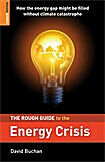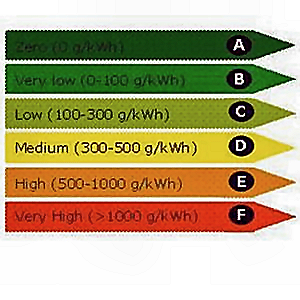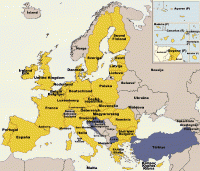Posted in Comment on 06/10/2011 09:53 am by Stephen Tindale
This summarizes a seminar held by Climate Strategies and the Institute for Sustainable Development and International Relations on why the EU should strengthen its climate and energy policies.
read more »
Posted in Comment on 03/11/2011 03:12 pm by Stephen Tindale
Yesterday, the UK government announced plans to introduce a Renewable Heat Incentive. So, it does seem to be taking seriously its promise to be “the greenest government ever”.
read more »
Posted in Comment on 11/11/2010 01:41 pm by Stephen Tindale
The Commission’s proposal for a new energy strategy is disappointing – it lacks specific policy proposals.
read more »
Posted in Comment on 07/12/2011 04:51 am by Stephen Tindale
The European Commission’s proposals for the 2014-2020 EU budget are a missed opportunity. There should be a major reduction in spending on agriculture and a major increase in climate spending.
read more »
Posted in Comment on 04/13/2012 09:14 am by Stephen Tindale
Denmark, the current president of the European Council of Ministers, should stand firmly behind the Commission’s proposals on energy efficiency and not give in to the demands of other member states.
read more »
Posted in Comment on 05/14/2014 11:37 am by Stephen Tindale
Swiss paper Le Temps has now published (in French) my article on the need for a new narrative for European integration. Here is the English version.
read more »
Posted in Comment on 05/14/2014 11:47 am by Stephen Tindale
The Economist has published my short article on why we need energy efficiency plus all clean energy sources: renewables, carbon capture and storage and nuclear.
read more »
Posted in Comment on 09/14/2009 06:22 pm by Stephen Tindale
Should we worry about oil and gas running out? No – for three reasons.
read more »
Posted in Comment on 07/15/2016 09:01 am by Stephen Tindale
The UK no longer has a department with the words ‘climate change’ in its title. Climate policy is now the responsibility of a new Department of Business, Energy and Industrial Strategy. This could be seen as a downgrading of climate action – and has been condemned by some green groups. But I think it is […]
read more »
Posted in Comment on 12/16/2011 09:35 am by Stephen Tindale
Durban was better than Copenhagen and a bit better than Cancun. However, it was basically just an agreement to keep talking. Policy makers must not allow international negotiations to exclude progress on national and regional measures.
read more »
Posted in Comment on 01/16/2012 12:41 pm by Stephen Tindale
Global investment in renewables and energy efficiency increased 5% to $260 billion in 2011, according to Bloomberg New Energy Finance.
read more »
Posted in Comment on 03/16/2010 02:25 pm by Stephen Tindale
This month, the US Department of Energy has announced a Sustainable Energy Resources for Consumers (SERC) programme. This will offer grants totalling up to $109 million.
read more »
Posted in Comment on 07/17/2009 07:33 pm by Stephen Tindale
On Wednesday 15 July 2009, the UK government published its plan to make the UK a low carbon economy. It is good on electricity, quite good on energy efficiency and heat, but bad on transport.
read more »
- Tags: carbon capture, carbon tax, CCS, CHP, climate change levy, coal power, decarbonisation, energy efficiency, fuel poverty, nuclear power, renewables, statistics, wind power
Posted in Comment on 11/17/2009 08:27 am by Stephen Tindale
Presidents Hu and Obama met today in Beijing and climate change was high on the agenda. China and the US are now the two largest producers of greenhouse gas emissions, responsible for over a third of total annual global emissions – though the US has caused 30% of the total historical contribution, whereas China has contributed just 7%, and US per capita emissions are 23.5 tons, whereas China’s are 5.5 tons.
read more »
Posted in Comment on 02/18/2010 09:41 pm by Stephen Tindale
In November 2009, 3% of OECD electricity was generated by renewables other than hydro. 14% came from hydro. And this was only 17% of what electricity was then used, not total energy used.
read more »
Posted in Comment on 02/18/2011 09:30 am by Stephen Tindale
There is already substantial debate – much of it heated – about the EU’s Budget from 2014 to 2020, the Multiannual Financial Framework. Money on agriculture should be reduced, while money on rural development and redistribution to poorer regions should be protected or increased. Spending on climate protection should be increased, and all spending should be ‘climate proofed’ to ensure it is not making things even worse.
read more »
Posted in Comment on 01/18/2017 08:45 am by Stephen Tindale
Last week the former energy minister Charles Hendry published his review on tidal lagoons (https://hendryreview.wordpress.com/) I am a consultant to Tidal Lagoon Power (TLP), so not disinterested. But I think that anyone reading the report will recognise it as an extensive, evidence-based and therefore serious review. Hendry was in my view a good energy minister […]
read more »
Posted in Comment on 06/18/2010 11:52 am by Stephen Tindale
Once again, European governments have been debating whether the EU greenhouse reduction target should be increased, from 20% below 1990 levels by 2020 to 30%, also by 2020. 20% will be easier to achieve than expected, given the recession, but is not enough of a reduction, so the target should be increased to 30%.
read more »
Posted in Comment on 08/19/2010 07:30 am by Stephen Tindale
Winter fuel payments in the UK should be reformed to give more help to those in fuel poverty or off the gas grid. The government should be put under pressure to do much more to improve existing buildings, including regulating the private rented sector.
read more »
Posted in Comment on 01/20/2011 11:05 am by Stephen Tindale
The Centre for European Reform has now published my short paper on what the EU should do on energy efficiency. This argues that there should be less emphasis on targets and more on specific policies, and on money.
read more »
Posted in Comment on 05/06/2015 10:08 pm by Suzanna Hinson
Analyses what the parties standing UK-wide are promising to do about climate change.
read more »
Posted in Comment, Policy on 06/24/2015 09:03 am by Stephen Tindale
Key quotes from, and a few of my comments on, the excellent Lancet Commission report
read more »
- Tags: 'cap-and-trade', carbon tax, CCS, coal power, decarbonisation, energy efficiency, EU, nuclear power, Public health, renewables, solar power, wind power
Posted in Comment on 06/10/2016 07:28 am by Stephen Tindale
In less than two weeks’ time, the UK will vote on whether to stay in or leave the EU. I am doing all I can for the Stronger In campaign (http://www.strongerin.co.uk/#QkGoYymoqlkpWtIE.97). Opinion polls predict a very close result. Being Labour, I never believe opinion polls. Britain could well vote to leave. But I’m also an […]
read more »
Posted in Comment on 10/21/2011 10:29 am by Stephen Tindale
Whatever the outcome of the Durban discussions, the EU should give priority to agreeing its draft energy efficiency directive, which will be good for human health and energy security as well as climate protection. It should also strengthen the Emissions Trading System by setting a floor price for the carbon permits.
read more »
Posted in Comment on 01/22/2014 02:55 pm by Stephen Tindale
Today, the European Commission published its proposals for a 2030 climate and energy framework. The targets are not ambitious, but policy makers should now focus on measures rather than numbers.
read more »
Posted in Comment on 10/22/2010 08:52 am by Stephen Tindale
The UK government has cut spending on climate schemes less than it has cut most other schemes. But is has cut local government grants by more than a quarter, so local government must play a greater role on energy efficiency schemes. In addition, the government should have made winter fuel payments means-tested.
read more »
Posted in Comment, Policy on 02/23/2012 04:58 pm by Stephen Tindale
President Obama has again asked the US Congress to agree a budget which cuts the more than $40 billion in tax breaks for oil, gas and coal producers over the next decade. The president’s budget proposals are sensible and should be passed by Congress. But they won’t be. The left-right divide on climate in US politics is unnecessary.
read more »
Posted in Comment on 07/23/2009 07:30 am by Stephen Tindale
A meeting of EU energy and environment ministers this week in the Swedish town of Are is discussing energy efficiency. It is certainly good news that politicians are focussing on this. Using energy wastefully makes no climate or economic sense, but many politicians regard the subject as too ‘unsexy’ to be worth much attention.
read more »
Posted in Comment on 11/23/2009 12:11 pm by Stephen Tindale
Not surprisingly, the media discussion of climate change is dominated by the countdown to Copenhagen. EU environment ministers are meeting today to try to strengthen the European negotiating position, though they won’t be able to make progress on the key issue of funding, as this is up to finance ministers.
read more »
Posted in Comment on 02/24/2011 07:34 am by Stephen Tindale
The European Investment Bank increased its lending to projects to help control climate change to €19bn in 2010. This was a 19% increase over the 2009 figure and meant that climate projects accounted for almost a third of total EIB lending.
read more »
Posted in Comment on 04/26/2010 03:48 pm by Stephen Tindale
This morning I attended an event called ‘Ask a Climate Question’ organised by a coalition of environment and development groups. The most striking aspect of the discussion was that, with the exception of nuclear power, there was broad consensus among the four parties.
read more »
Posted in Comment on 06/26/2014 06:33 am by Stephen Tindale
You can read here my Sunday Express article on David Cameron’s attempt to stop Jean-Claude Juncker becoming President of the European Commission.
read more »
Posted in Comment on 10/26/2014 09:47 am by Stephen Tindale
My article for ‘Responding to Climate Change’ on European governments’ acceptance of Commission proposals for a 2030 climate and energy package.
read more »
Posted in Comment on 12/27/2011 02:17 pm by Stephen Tindale
The European Commission should focus on proposing specific policies, rather than modelling different scenarios. It has done well with its energy efficiency proposal; now it should propose strengthening the ETS and setting a 2030 renewables target.
read more »
Posted in Comment on 09/27/2010 01:38 pm by Stephen Tindale
Ed Miliband was a good Energy and Climate Change Secretary, so the UK now has a ‘green’ Prime Minister, ‘green’ Energy Secretary and ‘green’ Leader of the Opposition. Now for some delivery…
read more »
Posted in Comment, Repowering communities on 10/28/2010 11:19 am by Stephen Tindale
This week, I was taken on a tour of properties owned by Islington Council. Islington is an area of London with many council home. The borough council was run by the Liberal Democrats until May 2010. However, in the local elections, it reverted to Labour control – it has been run by Labour for most of the last few decades. The Liberal Democrat leader, Terry Stacy, was personally very committed to action on climate and fuel poverty, and the new Labour leader, Catherine West, appears to be the same.
read more »
Posted in Comment on 11/03/2010 10:01 pm by Stephen Tindale
The UK government’s announcement on a Green Deal for energy efficiency is good news and some movement is promised on regulating the private rented sector. However, there is too much delay and the threat of yet more consultation.
read more »
Posted in Comment on 04/30/2010 06:47 am by Stephen Tindale
The Obama Administration has given the go ahead for a 468Mw wind farm in Nantucket Sound, off the coast of Massachusetts. This will be the US’s first offshore wind farm and has been delayed in the planning process for almost a decade.
read more »
Posted in Comment on 10/04/2010 10:25 am by Stephen Tindale
Last week, I attended a European Commission conference on the future of energy policy. Energy Commissioner Oettinger delivered a worthy though unsurprising speech, but did at least stress energy efficiency – “vast untapped potential” – and said that this was his first priority.
read more »
Posted in Comment on 05/05/2010 02:21 pm by Stephen Tindale
This week, I attended a conference in Brussels organised by the King Baudouin Foundation. It was about how to control climate change while also increasing social justice. Therefore, the issue of making existing homes more energy efficient was central to the discussion.
read more »
Posted in Comment on 01/06/2011 09:30 am by Stephen Tindale
EU governments are failing to use money available for improving the energy efficiency of homes – using it to build new roads instead. The EU budget discussion must focus on re-prioritising, not on the total size of the budget.
read more »
Posted in Comment on 01/06/2012 12:39 pm by
Philip Lowe, the Director General, Energy in the European Commission, has responded to my criticism of the EU’s Energy Roadmap.
read more »
Posted in Comment, Policy on 12/07/2015 09:30 am by Stephen Tindale
The advance represented by Energy and Climate Secretary Amber Rudd’s ‘reset’ speech on 18 November has been pretty comprehensively destroyed by Chancellor George Osborne.
read more »
Posted in Comment on 01/07/2014 01:55 pm by Stephen Tindale
The German “Energiewende” is not doing as well as often claimed; but climate protection is too important for point-scoring or schadenfreude.
read more »
Posted in Comment on 06/07/2010 11:28 am by Stephen Tindale
Low carbon energy sources – renewables, CCS and nuclear – all require public financial support. In the UK, the new government has said that there will be no subsidy for new nuclear power stations. Before the general election, the Conservatives said that there would be no subsidy and the Liberal Democrats remain anti-nuclear. Without financial support, no new nuclear stations will be built. Nor will any renewables or CCS – offshore wind and CCS are, in the view of many, going to be even more expensive than nuclear.
read more »
Posted in Comment on 10/07/2011 07:03 am by Stephen Tindale
The EU has long prided itself on leading international efforts to control climate change. Today, the issue is nowhere near the top of the EU’s agenda, having been eclipsed by the economic downturn and the eurozone debt crisis.
read more »
Posted in Comment on 11/08/2011 03:47 pm by Stephen Tindale
Comment on the launch of the European Climate Foundation’s latest report, Power Perspectives 2030.
read more »
Posted in Comment on 08/09/2011 11:14 am by Stephen Tindale
President Obama has unveiled a new US fuel efficiency standard, which isn’t good enough, but much better than nothing.
read more »
Posted in Comment on 02/09/2011 04:42 pm by Stephen Tindale
The EU summit on 4 February, billed as an Energy Summit, said little new or unexpected. The forthcoming Energy Efficiency Action Plan must be much more ambitious.
read more »
Posted in Comment on 03/09/2011 03:27 pm by Stephen Tindale
The European Commission published its Energy Efficiency Plan yesterday. It isn’t bad, and calls for combined heat and power to be made mandatory in some cases. The plan should be implemented without delay.
read more »
Posted in Comment, Policy on 04/22/2015 03:41 pm by Suzanna Hinson
The EU should not buy electricity from countries with highly-polluting coal power stations, and should instead support efficiency and clean energy in these countries.
read more »
- Tags: biomass, carbon capture, CCS, CHP, coal power, decarbonisation, energy efficiency, nuclear power, renewables, solar power, wind power
Posted in Policy on 08/27/2009 11:56 am by Stephen Tindale

The Labour Party came to power in 1997 committed to devolving powers to Scotland and Wales, and re-creating a London-wide government. It was also determined to improve the political situation in Northern Ireland and was willing to use devolution to achieve this. Therefore, the last 12 years have seen considerable change to the constitution of the UK. Climate change was not a driving force behind any of this, but, nevertheless, the new tiers of government have had significant impact on what the UK is doing.
read more »
Posted in Behaviour on 11/04/2015 10:34 am by Suzanna Hinson
Four key things that individuals can do to improve energy efficiency at home
read more »
Posted in Books, Policy on 10/18/2010 06:03 pm by

The European Union cannot be accused of failing to see the big picture on climate change. The only problem, and it is major, is that Europe lacks followers of its lead. However, for years, EU policy on energy – responsible for around two-thirds of all greenhouse gases – has seemed remarkably narrow. It has focused almost exclusively on networks and, among networks, almost exclusively on electricity and gas.
In his new book, ‘The Rough Guide to the Energy Crisis’, David Buchan outlines the ways forward.
read more »
Posted in Repowering communities on 06/22/2010 05:36 pm by

This is a summary of a longer paper by Prashant Vaze and Ed Mayo on how a new, low-carbon energy infrastructure can be financed at reasonable cost.
read more »
Posted in Policy on 04/17/2010 05:44 pm by Stephen Tindale

All three main UK parties take climate seriously and promise to reduce emissions and expand low-carbon energy. They all recognise the energy security and employment benefits. This article includes direct quotations from the relevant parts of the manifestos of the three main parties on general climate policies, covering investment, taxation, land-use planning, adaptation, the EU, the developing world and forests.
read more »
Posted in Policy on 04/17/2010 05:53 pm by Stephen Tindale

All three main UK parties take climate seriously and promise to reduce emissions and expand low-carbon energy. They all recognise the energy security and employment benefits. This article includes quotations from the relevant parts of the manifestos of the three main parties on heat and electricity – energy efficiency, fuel poverty and energy production.
read more »
Posted in Policy on 12/06/2010 07:36 pm by Stephen Tindale

The US federal government passed energy acts in 2005, 2007 and 2008, each aiming to increase energy efficiency and expand renewables. The 2009 Recovery Act also had money for these, However, to get a clear picture of American energy policy, we need to look not just at federal programs, but also at what state governments are doing.
read more »
Posted in Comment on 08/09/2016 12:56 pm by Stephen Tindale
Consultancy Remsol has today published a constructive Blueprint for shale gas community benefits. (http://www.remsol.co.uk/wp-content/uploads/2016/08/Remsol-A-Blueprint-for-Shale-Gas-Community-Benefits-09082016.pdf ). I wrote the foreword: “UK shale gas production could and should be part of a low-carbon transition, enabling Britain to phase out coal more quickly while strengthening energy security. Domestically-extracted shale gas would be less climate-damaging than coal, but also than […]
read more »
Posted in Policy on 10/13/2010 01:24 pm by Stephen Tindale

The EU should strengthen its CHP directive so that, whenever anything is burnt to generate electricity, the heat must be used. It should also require member states to do as the Swedes do and require energy efficiency improvements whenever a property is sold or rented out.
read more »
Posted in Comment on 04/12/2014 05:54 am by Stephen Tindale
My CER blog on how Europe should reduce its dependence on Russian gas
read more »
Posted in Comment, Policy on 03/28/2015 07:30 pm by Stephen Tindale
Climate campaigners should be more pragmatic and more prepared to make compromises. Pragmatism often delivers progress; idealism rarely does.
read more »
Posted in Policy on 06/02/2010 11:04 am by

What is a pace? The length of a stride? The speed of activity? The pace that is attracting the most attention in the US in 2010 is Property-Assessed Clean Energy. Like many US trends and fads, it is worth understanding for its possible influence outside beyond North America.
read more »
Posted in Comment, Policy, Technology on 10/23/2015 08:57 am by Stephen Tindale
The Committee on Climate Change sensibly calls for an ‘all of the above’ approach to decarbonisation.
read more »
- Tags: air quality, biofuel, biogas, biomass, CCS, decarbonisation, electric cars, energy efficiency, EU, nuclear power, renewables, solar power, tidal power, wave power, wind power
Posted in Policy on 01/18/2010 06:55 pm by Stephen Tindale

How well have Obama and Energy Secretary Chu done so far on promoting energy efficiency, renewables, CCS and electric vehicles? A very positive assessment is made by the Center for American Progress.
read more »
Posted in Policy on 11/16/2009 04:58 pm by Stephen Tindale

This article reviews the climate performance of different US states and is mainly based on Climate Change 101: state action published by the Pew Centre on Global Climate Change and on State of the States 2008: Renewable Energy Development and the Role of Policy published by the US Department of Energy’s Renewable Energy Laboratory.
read more »
Posted in Answers to your questions, Technology on 10/25/2010 03:43 pm by Administrator

Question: Just curious, but how expensive is a widespread district heating network for, say, 100,000 inhabitants?
Alessandro De Mida
read more »
Posted in Repowering communities on 08/21/2010 09:17 am by

How Babylon, New York used money raised from waste collection charges to overcome barriers to getting homeowners to make their properties more energy efficient.
read more »
Posted in Repowering communities on 06/22/2010 12:59 pm by Stephen Tindale

This article summarises what Berlin has done on energy efficiency. The material will be used in the Repowering Communities book. Comments very welcome.
read more »
Posted in Repowering communities on 09/08/2010 05:15 am by Stephen Tindale

Community-owned renewables are quite rare in the UK, but extremely common – mainly wind farms – in Germany and Denmark. The UK is at least now moving in the right direction, albeit slowly.
read more »
Posted in Repowering communities on 08/28/2010 03:12 pm by Stephen Tindale

Freiburg has a well-deserved reputation as Germany’s green capital. It uses on about half of the energy that other European cities of 200,000 people do, and has become a world leader in solar. This article looks at what the city council has done to achieve this.
read more »
Posted in Repowering communities on 07/29/2010 03:08 pm by

Lessons from California on what to do – and what not to do.
read more »
Posted in Repowering communities on 08/21/2010 08:40 am by Stephen Tindale

Austrian regions (Länder) play a significant role in energy, particularly regarding building efficiency and heating, including district heating. Upper Austria is one of nine regions, covering 12,000km2, with 1.4 million inhabitants. It is highly industrialised, with significant heavy industry (manufacture of steel and machinery).
This article is about how Upper Austria manages to get a third of its total energy use, and almost half its heat, from renewables.
read more »
Posted in Repowering communities on 07/16/2010 08:40 pm by

Tiny Vermont is the second smallest state in the US by population and the fifth smallest by area. Its economic reconstruction efforts are understated. So too are its efforts to provide its homes and businesses with sustainable heat and power.
read more »
Posted in Repowering communities on 11/02/2010 04:34 pm by

This is a paper that the three authors of the Repowering Communities book discussed with UK government officials and other experts at a seminar on 1 November 2010. It covers examples of which local governments are doing best on energy efficiency and renewables, and makes some recommendations.
read more »
Posted in Policy on 08/21/2010 02:48 pm by

The debate about climate change is still strong and prominent, and the ways we deal with it are discussed on a regular basis. Organisations need to overcome certain barriers more efficiently and focus on driving change within the working environment, influencing central government to take more actions and avoid a ‘climate summit abject failure’ such as Copenhagen.
read more »
Posted in Comment, Policy, Technology on 01/25/2017 09:47 am by Stephen Tindale
The low-carbon energy sectors – efficiency, most renewables, CCS and nuclear – should work together more strategically
read more »
- Tags: biomass, carbon capture, CCS, CHP, decarbonisation, energy efficiency, nuclear power, renewables, solar power, solar thermal, tidal power, wind power
Posted in Policy on 04/05/2011 04:32 pm by Stephen Tindale

The EU should spend less money on agriculture and more on improving the econommies of poorer member-states and on climate protection.
read more »























